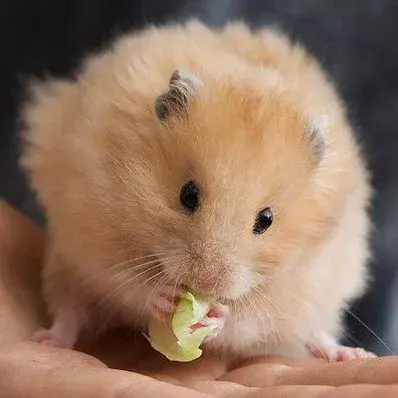History/Origin
The Golden Hamster is originally found in Syria and southern Turkey and is a popular choice among small pet enthusiasts. Discovered in the late 1930s, these hamsters quickly gained popularity due to their lovely appearance and manageable size.
Personality
Golden Hamsters are friendly and gentle. These small creatures are generally curious and enjoy exploring their surroundings. However, they are most active during the night.
While they are mostly solitary animals, they may form a bond with their human caregivers through regular, gentle interaction. But not with other hamsters! They can be highly territorial and aggressive towards each other. So you should keep a pet hamster separate from other hamsters or even other pets that you own.
Physical Appearance
The physical traits of these little furballs are one of the most significant factors that make them popular.
- Size
Typically measuring between 4 to 6 inches, Golden Hamsters have a compact and round body, making them an ideal size for small cages or habitats.
- Coat Color
As their name suggests, these hamsters boast a golden-brown fur coat with a distinctive white belly, creating a visually appealing contrast. The soft and dense fur adds to their endearing appearance.
Gender Differences
The overall differences between male and female Golden Hamsters are subtle. Both genders exhibit similar behaviors and temperaments, making equally delightful pets.
Feed/Nutrition
These small rodents have specific dietary needs that, when met, contribute to their overall well-being and longevity.
Basic Diet
A high-quality hamster pellet mix serves as the cornerstone of your Golden Hamster’s diet. These pellets are specially formulated to provide essential nutrients, vitamins, and minerals required for their optimal health. Ensure the pellets contain a balanced mix of grains, seeds, and other nutritional elements.
Fresh Fruits and Vegetables
In addition to pellets, supplement your hamster’s diet with fresh fruits and vegetables. Favorites among Golden Hamsters include small amounts of apple slices, carrot pieces, broccoli, and leafy greens. These additions not only introduce variety but also provide additional vitamins and fiber.
Protein Sources
Golden Hamsters benefit from protein sources in their diet. Consider including small amounts of lean protein, such as cooked chicken or mealworms, to support their muscle development. However, moderation is key, as excessive protein intake can lead to health issues.
Hydration
Fresh, clean water should always be available to your hamster. Use a sipper bottle attached to the cage to prevent spillage and ensure a constant supply of water.
Avoid Harmful Foods
Certain foods can be harmful to Golden Hamsters and should be strictly avoided. These include sugary treats, chocolate, caffeine, and high-calcium foods. Additionally, steer clear of sticky or excessively hard foods that may pose a choking hazard.
Feeding Schedule
Establish a consistent feeding schedule for your Golden Hamster. Providing food in the evening aligns with their natural nocturnal behavior. Monitoring their food intake allows you to adjust portions based on their activity levels and individual needs.
Health
Golden Hamsters can be susceptible to health issues such as dental problems, respiratory infections, and obesity.
- Dental Problems: Hamsters have continuously growing teeth, and malocclusion (misalignment) can occur. Provide chew toys and monitor their eating habits to ensure proper dental health.
- Respiratory Infections: Changes in behavior, such as lethargy or labored breathing, may indicate respiratory issues. Keep their environment clean and well-ventilated to prevent infections.
- Obesity: Overfeeding and lack of exercise can lead to obesity. Ensure a balanced diet, control portion sizes, and provide opportunities for physical activity.
Care and Grooming
Grooming needs for Golden Hamsters are minimal. Providing a clean and safe habitat, regular food and water, and a wheel for exercise is essential.
Here are some steps you should take to ensure their well-being:
- Regular Veterinary Check-ups
Schedule regular check-ups with an experienced veterinarian who specializes in small animals. These check-ups are essential for early detection of any health issues and to receive guidance on diet, dental care, and overall well-being.
- Balanced Diet
Maintaining a balanced and nutritious diet is foundational to your hamster’s health. A diet rich in high-quality hamster pellets, supplemented with fresh fruits, vegetables, and lean protein, provides the necessary nutrients for optimal health.
- Hydration
Ensure your hamster has access to fresh, clean water at all times. Dehydration can lead to serious health issues, so regularly check your water bottle for any blockages or leaks.
- Exercise
Golden Hamsters are active creatures that benefit from regular exercise. Provide a wheel in their habitat for them to run on, promoting physical activity and mental stimulation.
- Grooming
Golden Hamsters are generally clean animals and groom themselves. However, occasional checks for fur matting or signs of illness are recommended. A dust bath can be provided for them to keep their fur clean.
- Watch for Behavioral Changes
Pay attention to any changes in behavior, such as lethargy, changes in eating or drinking habits, or signs of distress. Ensure prompt veterinary attention if you observe any unusual behavior.
Rescue Groups
While Golden Hamsters are commonly available in pet stores, considering adoption through local animal shelters or rescue groups is a compassionate choice.
Golden Hamsters for Sale
Golden Hamsters can be commonly found in reputable pet stores. Always ensure the hamster comes from a healthy and well-cared-for environment.
You can check out these stores:
Interesting Facts
- Golden Hamsters are nocturnal, meaning they are most active during the evening and night.
- They have large cheek pouches that they use to store food, resembling a comical bulging appearance.
- These hamsters are excellent climbers and enjoy having tubes and tunnels in their habitat.
Best For
Golden Hamsters make excellent pets for individuals or families seeking a low-maintenance, small companion. They are well-suited for apartment living due to their compact size.
Top Name Ideas for Golden Hamster
| Male Golden Hamster Names | Female Golden Hamster Names |
| Sunny | Daisy |
| Teddy | Bella |
| Milo | Nibbles |
| Hammy | Cinnamon |
| Whiskers | Poppy |








